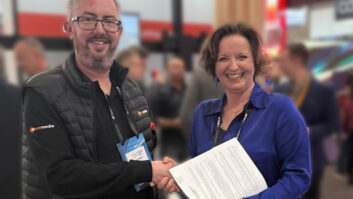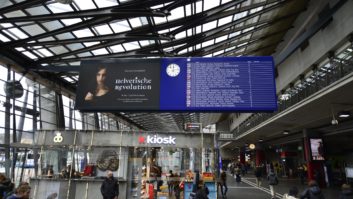Creditors of LeisureTech Electronics – the Australian distributor and developer of the A-Bus multi-room audio distribution system – have agreed to a Deed of Company Arrangement, reports Simon Croft. The agreement draws a line under the dispute between LeisureTech Electronics and Armour Group over the valuation placed on the former company after it went into liquidation.
Essentially, Armour Group and the other creditors have accepted an offer of part-payment, rather than pursue the whole amounts owed. LeisureTech went into voluntary administration with reported debts of Aus$1.6 million after having the UK patent for A-Bus revoked in a court battle with Armour Group, which ended in November 2008. In addition to Armour Group, the principal creditors were the Australian Taxation Office and LeisureTech’s lawyers, Allen & Overy LLP.
Before going into voluntary administration, LeisureTech sold its assets to AC & EM G Pty Ltd for Aus$2m. When it emerged that AC & EM G Pty was owned by LeisureTech founder and managing director Andrew Goldfinch (pictured left), along with Elisabeth Goldfinch and LeisureTech executive Jonathan Ritchie, Armour Group called foul, claiming the sale was fraudulent and instructing its lawyers to take action to recover the damages and legal costs it was owed following the earlier court case.
Speaking exclusively to IE Residential, Goldfinch said: “The differences were semantic because all valuations are subjective, within tolerances. We made a proposal to the creditors to make sure the matter was resolved and that is that the company arrangement is – and all parties voted for that, which resolves all the issues of the old company.”
Perhaps unsurprisingly, Armour Group’s chief executive George Dexter (pictured left) puts it slightly differently. He told IE Residential: “This was simply a commercial decision. The process of pursuing the matter to its rightful and just end would have required further investment and whilst this would have delivered a certain amount of satisfaction, there are more pressing matters to attend to, not least further developing the Armour Group.”
As LeisureTech was sold as a going concern, its structure and team remains the same, with the exception of the shareholding. The company retains the same key product ranges and Goldfinch was quick to quash rumours that A-Bus licensees including Russound had jumped ship.
“Russound is a licensee of ours and we haven’t lost any licensees,” said Goldfinch. “Across the board, our relationships with these people are mostly unchanged.”
Armour Group’s case against LeisureTech’s A-Bus patent rested primarily on the argument that the use of Cat5 to distribute power and audio signal was obvious.
“LTE approached Armour stating its position that it wanted a royalty in respect of sales of Armour’s Systemline Modular system,” said Dexter. “We explained that we did not recognise the validity of the patent Ö and therefore were not prepared to pay the royalties demanded.
“We did state that if we were forced to by LTE we would instigate revocation proceedings, although we would rather not go to court given the costs in doing so,” Dexter recalled. “LTE persisted in their demands and we were left no alternative but to start revocation proceedings in the UK and at the European Patent Office (EPO).”
So where does this put Armour’s Systemline Modular, it system for sending power, audio and data over a single Cat5 cable? “In Europe there are the continuing revocation proceedings which will run their course over the next 12 to 15 months,” said Dexter.
“Elsewhere in the world, North America is of no great concern to Armour in the current climate. We have not been active in the North American multi-room market and given the current state of demand and the level of competition, we do not see it as a financially attractive market in the short term,” Dexter added. “In Australia and New Zealand we have been selling successfully a two-wire version of Systemline Modular.
“As a general point with the continuing advance of technology, our view is that the LTE patent, where it is still valid, will be overtaken by new systems using network and powerline based technologies and the patents will consequently become redundant,” Dexter predicted. “We believe that this will happen well before the patents technically expire and in all likelihood within the next two-to-three years.”
“A-Bus is pretty bullet-proof technology and the need to go digital is not really there because the sound quality is still better and we can accomplish everything we want,” Goldfinch claimed.
He argued that the relevance of A-Bus would actually increase as the demand for multi-room audio filtered from the high end into the more price sensitive mid-market.
“All A-Bus products comply with the same standard and are interchangeable, so you can plug-and-play,” said Goldfinch. “You can go single source, multi-source and anyone can design an A-Bus system and assemble it, not having to know if there’s enough watts or the impedance, or something they have got to be careful of. We’ve done that in the development of the technology.
“You see, the market is very difficult with the world economy these days. We’re getting a lot more feedback from the States these days through our 01800 number of people wanting simpler solutions and things of that nature,” Goldfinch added. “A-Bus, I think, does have a fantastic future.”







